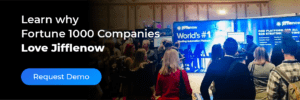Congratulations on completing a great event! We’re sure all your hard work paid off, and the event was a thumping success.
We’ve previously spoken about social media strategy for events. In this post, we’ll look at the best practices to adopt after you’ve had a great event.
You would have done most of the heavy lifting for social media before and during the event, but there’s still some work to be done. Since social media is a great channel to reach out the most pertinent audience, you can gain great insights to keep up your track record of stellar events, and make the next one a bigger success than this.
Here is a list of things you can do:
Sharing good media coverage
If you’ve had a good run at the event, you can definitely expect some good coverage from event website, and bloggers alike. Be sure to pick out the ones which offer specifc points about why you event was a success. Choose the ones that emphasise attendee engagment, size of the deals closed and so on.
This does wonders for your credibility, and improves your online visibilty. Since social media is a machine that runs on shares, pick out articles that you think your target audience are most likely to share to their network.
Professing the success also sends a message to those who didn’t turn up to your event, and also to the ones who were on the fence about attending. Give them a solid reason to ensure that your next event is not to be missed.
Ask for feedback
We’re going to take it for granted that you already have sent out post-event survey through all your other channels. The validity of feedback rests on having a large set of respondents. So include social media in the channels that you send out your event feedback in. Social media will help you catch the people who fell through the cracks in the other channels. You can include a shorter version of the survey (on most social media channels) because people tend to have shorter attention spans on social media – try to keep it under 2 minutes to fill out the survey, and make sure that you call out that it only takes a short time to fill it up.
When you post on social media about your event, you might notice negative comments where attendees might talk about, this is almost inevitable. Acknowledge these comments and compile a list, to see if you can find any patterns or common concerns. This will come in handy while planning the next events, as a set of pitfalls that you know that you should avoid.
Engage audience after the event
Post-event engagement can help with keeping leads warms, and gives you more mindshare with your attendees. But if you expect them to talk about your event, you need to give them a reason to talk. Put out posts with an honest call for positive experiences at your event – try asking about the most memorable booth or the most lip-smacking offering from the breakfast buffet. We’ll let you choose what kind of compliment to fish for. If you have recorded video testimonials from attendees, this is the best place to show it. Highlight reels from the event is also a brilliant choice.
Hype up your next event
While you are basking in the glow of the success of your current, this is the perfect time to snap up an audience that is already primed, and promise another event experience that is as exhilarating as the one they just attended. And for the ones that didn’t attend, you would have made a great case for not missing the next one with the tips above. Throw in free or discounted registrations for the next one to get them interested and invested.
Analyze your own social media performance
After the event is over, and you are done with your post-event activities, comes the time to analyze your social media plans. If you’ve set targets at the beginning of the campaign, this makes it really easy to gauge your performance. See where you’ve fallen short, and see how that has affected the key metrics for your event.
If you have not defined your goals, benchmark your current performance with other events of similar scope. Every social platform worth it’s salt would have an in-built analytics tool that will tell you all you need to know about your performance. You can learn more about measuring social performance from here.



